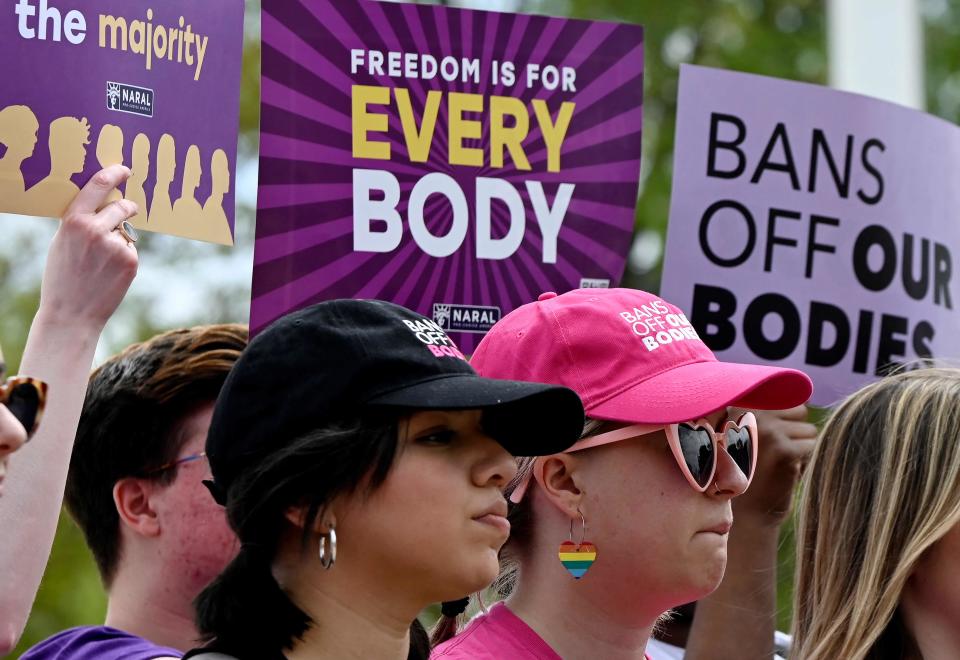US plummeted in world happiness ranking because of young people like me. I'll tell you why.
Young people in the United States aren’t happy. At least, that’s the takeaway from this year’s World Happiness Report.
The annual analysis by Gallup, the United Nations and more ranked the United States at No. 23, knocking the country out of the top 20 for the first time ever. It’s apparently all thanks to the folks under 30 – when they’re the only ones accounted for, the country falls to 62 in the rankings.
As someone who is under 30, I’m not surprised in the slightest. In the 2021-23 period, we have experienced huge life changes amid a pandemic, a new president and persistent economic anxiety. We, collectively, aren’t OK.
The happiness scores come from six criteria – GDP per capita, social support, healthy life expectancy, freedom, generosity and corruption. Despite the large-scale criteria, I have some ideas as to why people my age are unhappier than older folks in the United States.
COVID pandemic happened right as we entered adulthood
One of the biggest sources of unhappiness for people my age has been the aftermath of COVID-19.
Think about it: For those of us entering adulthood four years ago, the “before” and “after” of the pandemic has been drastic. Some of these young people finished high school or college during COVID-19. Others were just starting their careers.
Suddenly, we all had to confront the reality of disease, of isolation and of government incompetence. Then we had to confront death – nearly 1.2 million people have died of COVID-19 since the Centers for Disease Control and Prevention began tracking cases in 2020.
Then came the economic ramifications. A USA TODAY analysis of Medicaid data revealed a 17% increase in Zoloft prescriptions from 2019 to 2022, and a 12% increase in mental health drug prescriptions overall.
Groceries got more expensive. Student loan payments restarted after a three-year pause. The cost of renting increased 15% between 2020 and 2022, and Redfin data from 2023 showed a 44% increase in the country’s median home price since January 2020.
For people under 30, these financial stressors hit during a coming-of-age period that is defined by the very things that went upside down.
Conversely, there have also been increases in youth suicide and homicide rates since the start of the pandemic. These deaths also affect the emotional well-being of everyone in the victim’s immediate network.
Everyone went through the pandemic. The fact that it hit at such a specific time – when so many of us were transitioning to adulthood – made it difficult, and the "after" is still being felt.
Don't believe Gen Z will vote for Biden. My generation is up for grabs this election.
Gen Z lost rights while gaining political polarization
One of the other reasons young people in the United States may be feeling down is the loss of a right that our parents had – the right to an abortion nationwide. This is something that has disproportionately affected young women in particular, to the point that it will be a deciding factor come November.
According to KFF (formerly Kaiser Family Foundation), 1 in 8 voters now say abortion is most important to their vote. Last year, Gallup polling showed that 48% of 18- to 29-year-olds want legal abortion under any circumstances, and that 41% say it should be legal under certain circumstances.

Aside from the loss of Roe v. Wade, we're also in an election year. Right now, it feels like political polarization is at an all-time high, because we are being inundated with rhetoric. Everywhere you turn, political ads are reminding us of what is at stake this election – the reality of four more years of former President Donald Trump and his antics, or four more years of President Joe Biden and traditional Democratic politics despite a desire for something more.
Social media, doomscrolling impact mental health
A lot of this bubbles to the surface on social media, which already has proved to have negative effects on mental health. For me, using platforms like X and Instagram either leads to doomscrolling or a never-ending feed of consumer culture – people telling me what to buy, whether they're influencers or advertisers.
Biden, focus on voters not memes: I don't want my president to be a TikTok influencer. Biden is wasting time making jokes.
The solution to this, of course, is for us to use social media less. That's easier said than done when there are so many of us who rely on social media to grow our professional network, find new clients or simply to keep up with our friends.
Maybe it's easier for people who grew up without social media to give it up. It's harder for us who grew up through social media to see a world without it, even if it might make us happier.
OK, boomer: US ranks No. 10 when only older Americans are counted
The over-60 crowd in the United States seems much happier than their young counterparts. The country ranks 10th in the World Happiness Report when only that demographic counted.
Obviously, something has made their lives more bearable. They might be closer to paying off debts, or close to the possibility of retirement. Maybe it’s their marriage or children. Or maybe they're all fibbing and actually feel dreadful.
I’m jealous of the joy boomers and the Silent Generation apparently possess.
Or maybe the reality is that things are, in fact, not OK. We have lived through unprecedented times for the past few years, and now we're seeing the aftermath. It's not really surprising that young people aren't as happy as the rest of you – just don't expect us to grin and bear it, please.

Follow USA TODAY elections columnist Sara Peque?o on X, formerly Twitter, @sara__pequeno and Facebook facebook.com/PequenoWrites
You can read diverse opinions from our Board of Contributors and other writers on the Opinion front page, on Twitter @usatodayopinion and in our daily Opinion newsletter.
This article originally appeared on USA TODAY: Young people in US are unhappy. For Gen Z, that's not a surprise
